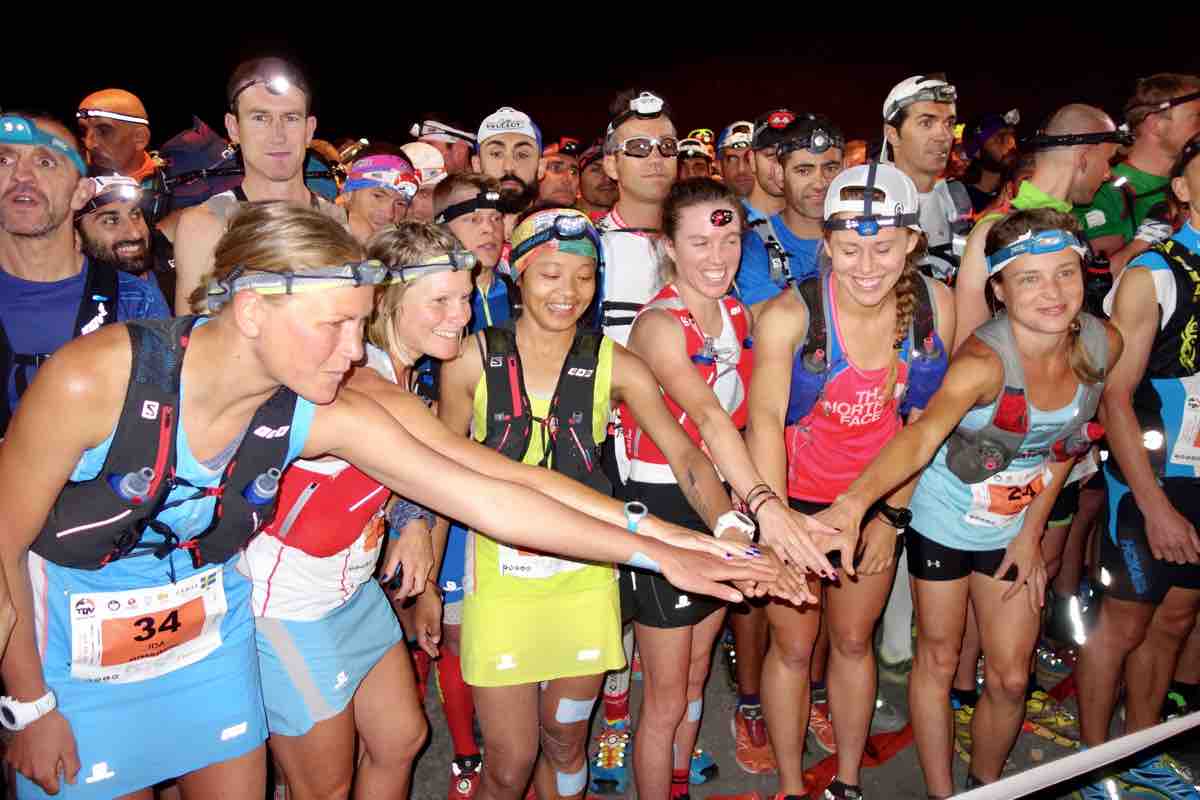It is early in the morning. The skies are dim, and I am tightening my shoelaces for the third time. The race director makes announcements, then calls the runners to the start line. He asks for the fastest runners to come to the front and everyone else to file in behind. This way, slower runners will not impede the faster ones when the gun goes off, and those in contention will have fair starting positions.
This is an odd moment if you think about it, and I do. Unlike in track races, where runners are given a hip number and assigned a lane, road and trail runners are asked to self-seed, or to position themselves compared to one another before the race starts. To do so, we need to know two things — our own speed and the field’s speed. We need to anticipate where we will stack up before the gun goes off.
I want to tuck myself into the middle of the field because I am uncomfortable with the idea of being proud or brash, or even being perceived as such. But I remind myself that humility does not require self-sabotage or mousy behavior. I have trained really hard, and I plan to run fast. I think I can win. Furthermore, I want to win. So, I take a deep breath, tighten my shoelaces one last time, and find a spot on the starting line.
Pride Goeth Before a Fall [Race]
The running world (and our culture more broadly) has an uneasy relationship with excellence. It seems like we can’t decide whether aspiration is presumptuous and cocky, or something we should celebrate as admirable. We often give excellent people a platform and set them up as exemplars. Yet we also sometimes speak as though setting big goals or wanting to be excellent is a bad thing. We speak as if humility requires that we set modest objectives and act as though we have low self-esteem, deflecting compliments and suppressing aspirations.
As a young philosopher, I was pleased to read about the virtue of magnanimity for the first time and to realize that — if done well — it can be an asset, rather than a defect, to aim for great things. In fact, to do otherwise may actually be a vice.
The Concepts
Magnanimity means greatness of soul. It is a virtue described by Aristotle and revised by Aquinas, among others, and it is a virtue important in athletics because competitive sports are aspirational in character, or concerned with greatness. For Aristotle, the magnanimous person “deems himself worthy of great things and is worthy of them (1).” He knows his relative value as an agent, is aware of his capacity for doing great things, and does those great things (2). Magnanimity captures the runner whose pursuit of greatness is informed by an accurate self-appraisal and knowledge of which great feats are, in fact, worthwhile.
The virtue of magnanimity is described in opposition to the vice of pusillanimity, or smallness of soul. The pusillanimous person is so meek as to not aspire to excellence (3). My temptation to slip into the pack, far removed from the starting line at a recent road race, is an example. And while we might be inclined to think that such a person is humble for her modest intentions, the pusillanimous person is animated by two defects: misperception and inaction. She is “ignorant of [herself]” and “otherwise would long for the things [she] is worthy of (4).” She does not realize that she can do great things. Moreover, because she is wrong about her capabilities, she does not live up to them.
Magnanimity Gone Awry
In general, ultrarunners are a driven lot. So, with these two concepts in mind, can we all proceed with clear conscience, aspiring for greatness? Yes, and no. Striving for excellence is not in itself problematic. Still, the reason why we often ask this question — of whether one can strive for greatness in a virtuous way — is that there are many odious forms of striving. It is easy to call to mind people who aspire to great feats and accomplish them, yet are also terrible members of the community. It is easy to think of great athletes with big heads. There are at least three ways in which magnanimity regularly falls into error.
Inordinate Desire
This is probably obvious, but you can be too in love with the idea of being great. It is one thing to want to be excellent. It is another thing to have an outsized desire for excellence that crowds out the love of more worthy things.
Earlier, I stated that magnanimity is a virtue concept that was revised by Aquinas and others. One revision Aquinas made to Aristotle’s account was to describe the desire for excellence in a way that did not harbor an “inordinate desire for pre-eminence (5).” Magnanimity was redescribed as a kind of excellence that was not maliciously proud. Stated differently, it is wonderful to desire excellence in running (or in any other worthwhile objective), but if your own excellence becomes an outsized concern, such that you care less about people or about things of greater value, then you’ve fallen into the vice of pride.
Error of Perception
You can misperceive the source of your excellence, thinking you accomplished everything yourself. The magnanimous runner forgets that she didn’t become great alone. She did so with the help of others (6). Even really excellent people depend on the support of friends, family, coaches, and community.
Interestingly, even though ultrarunning is very much an individual sport, this is not a common error for ultrarunners. If you have ever competed in an exceedingly long race, it becomes apparent how much you depend on the kindness of strangers at aid stations, the race director, your family, your crew, and other runners on the course to finish. If you listen to the post-race interviews released by iRunFar after these races, you will notice that a theme of these interviews is gratitude for those who played a role in helping the runner to finish.
Error of Value
A third error of magnanimity is mis-valuing others. If you do big things, you might start to think you are a big deal and to see others as inferior. This is a mistake. You, with a long resume, are of equal value to you, with a short resume. And the runner who strives for big wins is no better than anyone else because our value as humans is not rooted in what we have accomplished.
Again, I think we generally know this. It is hard to have a big head in a sport that continually humbles you, no matter where you are in the pack. It is difficult to feel superior when big mountain climbs and difficult conditions continually put you in your place.
Exemplars
Often the best way we learn about a virtue is by identifying a role model, or someone who exemplifies it. We have many exemplars of magnanimity in distance running — people who strive for great things, informed by an accurate appraisal of their abilities, and who seemingly avoid the pitfalls I described. Some examples are Mario Mendoza, Zach Miller, and Magdalena Boulet.
Another example is Courtney Dauwalter. She strives for big goals, seems to know herself and her abilities very well, expresses gratitude consistently, and, by all accounts, is humble through her many successes. She positions herself on start lines, aware of her capabilities, and achieves aims “commensurate with [her] power (7).” She is a great example of this virtue in action. Courtney is great-souled.

Zach Miller running in Moab, Utah, held up by the author as an exemplar of magnanimity. Photo: Aaron Colussi
Final Thoughts
The running world has an uneasy relationship with excellence. We seem to be of two minds — celebrating great deeds and wondering whether our drive is problematic in some way. The classical tradition has two concepts — magnanimity and pusillanimity — that can help us navigate considerations of striving. Humility does not require self-effacing tendencies or the suppression of aspirations. It does not require that we be small-souled. We can aim greatly, in worthy pursuits. Still, we should be careful that our love of excellence does not puff us up with pride or lead us to wrongly feel superior.
Call for Comments
- How have you perceived the word “magnanimous” before reading this article, and has your viewpoint changed?
- What do you do in your daily life to balance confidence and accurate perception of your abilities with the humility common in our sport?
References
- Aristotle. (2011) Nicomachean Ethics. Transl. R. Bartlett & S. Collins. Chicago University Press, 1123a35.
- C.A. Boyd. (2014) “Pride and Humility.” In Virtues and Their Vices. Ed. by K. Timpe & C.A. Boyd. Oxford University Press, 248.
- Aristotle. Nicomachean Ethics 1125a18-28.
- Aristotle. Nicomachean Ethics 1125a22-25.
- Aquinas. De Malo VIII.2.ad.16.
- C.A. Boyd. (2014) “Pride and Humility,” 249-250.
- C.A. Boyd. (2014) “Pride and Humility,” 254.

